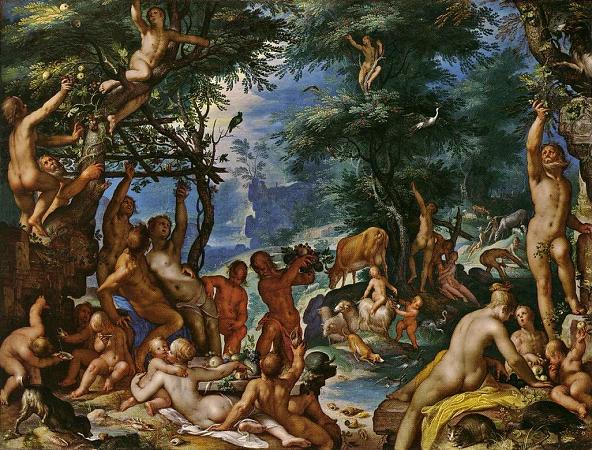
Golden Age. The term Golden Age comes from Greek mythology, particularly the Works and Days of Hesiod, and is part of the description of temporal decline of the state of peoples through five Ages, Gold being the first and the one during which the Golden Race of humanity lived.
Those living in the first Age were ruled by Kronos, after the end of the first age was the Silver, then the Bronze, after this the Heroic age, with the fifth and current age being Iron. By extension, Golden Age denotes a period of primordial peace, harmony, stability, and prosperity.
During this age, peace and harmony prevailed in that people did not have to work to feed themselves for the earth provided food in abundance. They lived to a very old age with a youthful appearance, eventually dying peacefully, with spirits living on as guardians.
Plato in Cratylus recounts the golden race of humans who came first. He clarifies that Hesiod did not mean literally made of gold, but good and noble.
In classical Greek mythology, the Golden Age was presided over by the leading Titan Cronus. In some versions of the myth Astraea also ruled. She lived with men until the end of the Silver Age. But in the Bronze Age, when men became violent and greedy, she fled to the stars, where she appears as the constellation Virgo, holding the scales of Justice, or Libra. European pastoral literary tradition often depicted nymphs and shepherd
Those living in the first Age were ruled by Kronos, after the end of the first age was the Silver, then the Bronze, after this the Heroic age, with the fifth and current age being Iron. By extension, Golden Age denotes a period of primordial peace, harmony, stability, and prosperity.
During this age, peace and harmony prevailed in that people did not have to work to feed themselves for the earth provided food in abundance. They lived to a very old age with a youthful appearance, eventually dying peacefully, with spirits living on as guardians.
Plato in Cratylus recounts the golden race of humans who came first. He clarifies that Hesiod did not mean literally made of gold, but good and noble.
In classical Greek mythology, the Golden Age was presided over by the leading Titan Cronus. In some versions of the myth Astraea also ruled. She lived with men until the end of the Silver Age. But in the Bronze Age, when men became violent and greedy, she fled to the stars, where she appears as the constellation Virgo, holding the scales of Justice, or Libra. European pastoral literary tradition often depicted nymphs and shepherd
Wikipedia ...